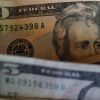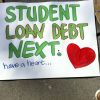-
 +26 +1
+26 +1Consumer debt hits $4 trillion — a record high
Americans are diving deeper and deeper into the red. As of this month, outstanding consumer debt exceeded $4 trillion for the first time, according to the Federal Reserve. Relatively strong holiday spending, particularly in November, and increasing credit card debt added more than $41 billion in outstanding balances at the end of 2018, according to LendingTree, a loan comparison website, which analyzed the data from the Fed.
-
 +15 +1
+15 +1Student loans are driving a "rural brain drain" as students flock to big cities
College students from rural areas are moving to big cities for higher wages to help pay off their student loans, according to new research from the Federal Reserve. Why it matters: A "rural brain drain" has been pulling college-educated people out of rural America and into urban areas, deepening an educational and political divide that is increasingly coming to define the country.
-
 +10 +1
+10 +1Americans see themselves in debt forever, even as they continue to borrow
Although shoppers kept credit card machines busy this holiday season, growing evidence indicates that Americans are starting to feel uneasy about the pile of debt to which we continue to add. A new survey from CreditCards.com finds that more than two in five Americans currently carrying debt don’t know when they’ll pay off those balances — and one in four say they expect their debts to outlive them. “It’s definitely a depressing statistic,” said Ted Rossman, industry analyst for the site. “When we did a similar study back in 2013, only 9 percent never expected to get out of debt, and now it’s 25 percent.”
-
 +15 +1
+15 +1Debt? What debt? At $22 trillion, here's the argument the national debt doesn't matter
So much ink has been spilled for so long on the national debt, it might be nice if that $22 trillion plus on the red side of the US balance sheet just didn't really matter. That's exactly the thinking behind a new school of economic theory that the government should be spending more, not less.
-
 +21 +1
+21 +1The Education Department Is Canceling $150 Million Of Student Loan Debt
The U.S. Department of Education is sending emails to about 15,000 people around the country telling them: You've got money. These are former students — and some parents of students — who took out loans for colleges that shut down between Nov. 1, 2013, and Dec. 4, 2018. About half attended campuses run by Corinthian Colleges. They will get their money back or have their debt forgiven — an amount estimated at $150 million, all told — under a provision called Automatic Closed School Discharge.
-
 +3 +1
+3 +1Eliminating All Student Debt Isn’t Progressive
Democrats won’t be able to do much policymaking over the next two years, because of President Trump and the Republican Senate. But they can still use their House majority to do more than investigate Trump. Democrats can hold hearings and pass bills that make clear their party’s vision for 2020 and beyond. They can figure out which ideas have the potential both to improve people’s lives and to win over voters.
-
 +16 +1
+16 +1The US government is set to spend more on its debt than on the military within a decade
The US federal government could soon spend more on interest for its debt then on the military, The New York Times reported. Interest payments are expected to make up 13% of the federal budget a decade from now, up from 6.6% in 2017. Tax cuts, spending increases and rising interest rates will make it more difficult to respond to future recessions or spend on other needs, the Times said.
-
 +3 +1
+3 +1Just 96 of 30,000 people who applied for public service loan forgiveness actually got it
Earlier this month, CNBC tracked down one of the first people to qualify for student debt cancellation under the public service loan forgiveness program, which allows certain not-for-profit and government employees to have their federal student loans scrubbed after 10 years of on-time payments. "I feel pretty lucky," Kevin Maier, a tenured professor at the University of Alaska Southeast, had said. He really should.
-
 +2 +1
+2 +1The Subprime Mortgage is Back on the Market, and Has a Brand New Name
A little more than a decade ago the economy collapsed, and at the center of that collapse was the subprime mortgage. These loans, often made to borrowers with bad credit, no job, and no income turned into a systemic risk that eventually sent the world into its worst economic crisis since The Great Depression. Fast-forward to 2018, and according to a report from CNBC, the subprime mortgage is back--this time with a new name: nonprime. Of course, that's just a change in brand. Like subprime mortgages, nonprime mortgages are offered to customers with credit scores as low as 500.
-
 +13 +1
+13 +1How to Pay Off Debt: 6 Strategies That Work
In more ways than one, debt can be a four-letter word. When it gets out of control — whether from medical bills, shopping sprees, or unexpected emergencies — it becomes an albatross that affects your emotional and physical health. Although it might feel overwhelming, you can tackle any debt the same way: one step at a time. Here’s how to pay off debt — and how to pay off credit card debt, in particular — even when it seems impossible.
-
 +9 +1
+9 +1The Student Debt Problem Is Worse Than We Imagined
Millions of students will arrive on college campuses soon, and they will share a similar burden: college debt. The typical student borrower will take out $6,600 in a single year, averaging $22,000 in debt by graduation, according to the National Center for Education Statistics. There are two ways to measure whether borrowers can repay those loans: There’s what the federal government looks at to judge colleges, and then there’s the real story. The latter is coming to light, and it’s not pretty.
-
 +14 +1
+14 +1World Bank recommends that countries eliminate minimum wage, dismantle wrongful dismissal rules and contractual protections for workers
A draft of the World Bank's annual flagship World Development Report says that its creditor-states (the poorest countries in the world) should eliminate their minimum wage rules, allow employers to fire workers without cause, and repeal laws limiting abusive employment contract terms. The bank argues that this is necessary to stop employers from simply investing in automation and eliminating workers altogether.
-
 +7 +1
+7 +1Trump tax plan will make U.S. only advanced economy to see its public debt ratio increase, IMF warns
The United States is the only country with an advanced economy that will see its public debt ratio increase over the next three to five years, according to a new report issued by the International Monetary Fund (IMF). As the ratio rises, so will tax rates and America's inability to stabilize the economy during recessionary periods, experts say. Because of the increased government spending and borrowing required by President Donald Trump’s tax cuts and two-year budget deal, the U.S. will take on deficits above $1 trillion over the next three years...
-
 +19 +1
+19 +1Students Use Loans to Fund Cryptocurrency Investment: Study
On March 22, 2018, a report was released by the Student Loan Study that raised a few eyebrows across the space. A survey of 1,000 college students with student debt were asked the simple question: The results were astounding with 21.2 percent answering in the affirmative. Although the details of the methodology used in the survey have been kept relatively vague and leave questions as to whether the subset selected could provide a realistic estimation, a case can be madefor these surprising results.
-
 +14 +1
+14 +1Credit card debt surpasses $1 trillion in the US for first time
U.S. consumers’ total credit card debt exceeded $1 trillion for the first time, according to a new study by the personal finance website WalletHub. Consumers took on an additional $92.2 billion in debt last year, the highest single-year amount since 2007. The average U.S. household owes $8,600 on credit cards, WalletHub found.
-
 +15 +1
+15 +1Bill Gates is paying off this country's $76 million debt
Billionaire philanthropists Bill and Melinda Gates will pay off $76 million of Nigeria's debt through their namesake foundation. The payments, which will be made over the course of 20 years, are due to begin this year.
-
 +17 +1
+17 +1Debtors' prison: ACLU report details 'criminalization of private debt'
Americans' reliance on household debt ─ and poor people's struggles to pay it off ─ has fueled a collection industry that forces many of them into jail, a practice that critics call a misuse of the criminal justice system. The accusation is documented in a report by The American Civil Liberties Union, which spent more than a year investigating collection methods across the country, saying it found more than 1,000 cases in 26 states in which judges, acting on the request of a collection company, issued arrest warrants for people they claimed owed money for ordinary debts, such as student loans, medical expenses, unpaid rent and utility bills.
-
 +11 +1
+11 +1Government must reconsider 'punitive' student loan interest rates, MPs say
The Government must reconsider “punitive” high interest rates on student loans and look at bringing back maintenance grants for poorer students, an influential Commons committee has said. Cross-party MPs on the Treasury Committee said that the Government should re-examine the student loan system which allows "high-flying lawyers" to pay less back than teachers.
-
 +13 +1
+13 +1The Median Young Family Has Nearly Zero Wealth
Using the Survey of Consumer Finances, I calculated various wealth series for young families with heads below the age of 35. Here is median net worth for young families. I include both the net worth concept used by the Federal Reserve and a modified net worth concept that excludes vehicles. Insofar as vehicles are rapidly depreciating consumer durables, many argue that they should not be counted as assets for these purposes. Without these vehicles, the median young family had a net worth of $1,250 in 2016. This was down from the $7,846 peak in 1995.
-
 +22 +1
+22 +1The looming student loan default crisis is worse than we thought
This report analyzes new data on student debt and repayment, released by the U.S. Department of Education in October 2017. Previously available data have been limited to borrowers only, follow students for a relatively short period (3-5 years) after entering repayment, and had only limited information on student characteristics and experiences.
Submit a link
Start a discussion




















